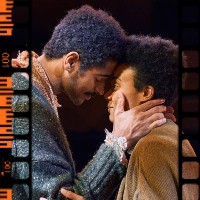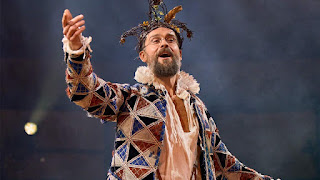And the play's oddness means that while some productions soar, others have a bit of trouble getting into it, and Rourke's is one of the latter. In a way its structure is similar to The Winter's Tale, with an opening of courtly intrigue giving way to pastoral comedy, except in this one the latter takes up the vast majority of the play.
That chilly opening can be funny, but this is one of those times the tone is a bit uncertain to start with, and it takes a while for the laughs to come. The show has been largely promoted off the back of beloved former Strictly champion Ayling-Ellis making her West End debut, and with a Deaf actress as the star it's been built around inclusivity (as well as D/deaf actors it prominently features trans and non-binary actors, including Harvey.) Here Celia communicates almost exclusively through sign language, which quickly creates the bond between her and her cousin, as the person who can most accurately communicate with her. It's also nicely used later in the play, as the reformed Oliver's (Ben Wiggins) keenness to learn how to talk to her is one of the things that makes their rushed relationship work.
The accessibility extends to the audience, with every performance captioned, although the show may lean on the surtitles a bit too much in terms of having Celia's dialogue understood by audiences who don't speak BSL - I feel like the 2018 Globe production, which also had a Deaf Celia, more subtly translated some of her dialogue in what the other characters said and how they responded, whereas here more often than not I felt the need to read the captions. But maybe it's simply the fact that they're there that makes it more tempting to read the original text rather than interpret the physical language.
On the other hand sound is a particularly big element, and in a play with so many songs I've seen it described as a proto-musical, music is literally put right on stage: Possibly having realised that veteral theatre composer Michael Bruce isn't too hard on the eyes, Rourke has him sitting at a baby grand piano playing his compositions throughout the show, and it's one of the more interestingly-used conceits. On the one hand he observes the action and alters the music accordingly, on the other hand the characters are aware of his presence and sometimes interact with him - Silvius (Nathan Queeley-Dennis) in particular actively tries to get him to alter the score to more favour his wooing of Phoebe (Mary Malone) over her crush on the disguised Rosalind.
As You Like It is a play with a feeling of Spring, referenced in some of the songs, but as with Bruce's low-key music Rob Jones' design keeps us firmly in autumn, with brown leaves falling to the stage throughout and providing a constant slip hazard (I saw Enoch have to steady himself when running across the stage more than once.) I think this is also only the second production I've ever seen to explicitly kill off Adam (June Watson) which is a tricky one to recover from with big LOLs. (The previous one was Sam Mendes', what is it with former Donmar bosses who've moved on the film directing?) The autumnal feel may be one of the factors that stop the comedy from really soaring - swapping Elizabethan ruffs for snoods is a good visual gag though.
A story that plays fast and loose with gender even by Shakespearean comedy standards is of course a good match to a cast including a non-binary lead, and there's a further nice twist at the end when Rosalind's transformation back into a woman is one of attitude only, walking off stage and then walking straight back again and being recognised. Although, if it's not covering a big costume change I have no idea why Touchstone's (Tim Mison) dreariest standup routine hasn't been cut. Mison generally has mixed fortunes with one of the trickiest fools in the canon, doing best in the chaotic romance with Audrey (Gabriella Leon.) Plimpton, whose Jaques has been given most of the songs, has the character most in keeping with the overall tone and is a nicely sardonic presence, although I would have liked more recognition of her proto-environmentalism and sadness at the destruction of nature being at the heart of her melancholy.
As I've said before I can be quite fussy about As You Like It - as the play which introduced me to the idea of Shakespearean comedies actually being funny for modern audiences I have high expectations of it, and this is one that never quite came together for me. The performances are strong but they neither quite gel, nor go to the opposite extreme and just embrace the chaotic nature of the story. High on charm but low on big laughs.
As You Like It by William Shakespeare is booking until the 28th of January at @sohoplace Theatre.
Running time: 2 hours 50 minutes including interval.
Photo credit: Johan Persson.







No comments:
Post a Comment